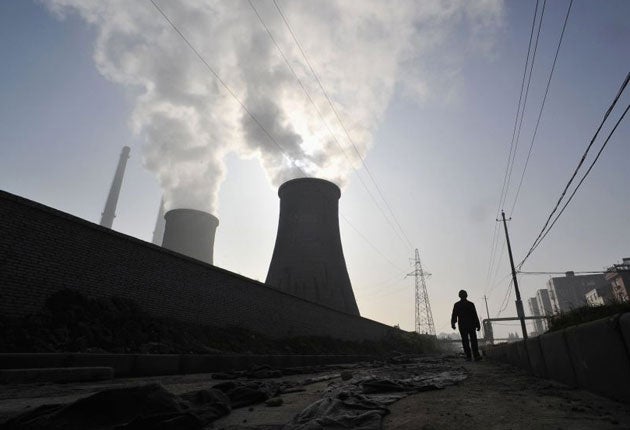Carbon emissions set to be highest in history
Curbs are too feeble to stop climate change accelerating

Emissions of man-made carbon dioxide in the atmosphere are roaring ahead again after a smaller-than-expected dip due to the worldwide recession. Scientists are forecasting that CO2 emissions from burning coal, oil and gas will reach their highest in history this year.
Levels of the man-made greenhouse gas being dumped into the atmosphere have never been higher and are once again accelerating. Scientists have revised their figures on global CO2 emissions, showing that levels fell by just 1.3 per cent in 2009 – less than half of what was expected. This year they are likely to increase by more than 3 per cent, greater than the average annual increase for the last decade.
The figures come after more than 20 years of dire warnings from scientists that governments need to begin curbing emissions drastically if the world is to avoid potentially dangerous climate change later this century.
In the 1990s, annual average emissions of carbon dioxide rose by 1 per cent, and in the past decade they increased at an average annual rate of 2.5 per cent. This year they are on target to accelerate even faster in the coming decade if governments fail to reach an agreement on CO2 targets at the UN meeting on climate change in Cancun, Mexico, which begins this month.
The latest analysis, by Professor Pierre Friedlingstein of Exeter University and Professor Corinne Le Quéré of the University of East Anglia, show that national attempts to stabilise carbon dioxide have been too feeble to have any noticeable impact on global emissions.
Only a global economic downturn appears to have had the desired impact, with emissions levels in 2009 being significantly below those of 2008. However, this blip in the overall increase was smaller than expected and has now been reversed, largely because of dirty coal being burnt in the developing world, Professor Friedlingstein said.
"The 2009 drop in CO2 emissions is less than half that anticipated a year ago. This is because the drop in world gross domestic product (GDP) was less than anticipated and the carbon intensity of world GDP, which is the amount of CO2 released per unit of GDP, improved by only 0.7 per cent in 2009 – well below its long-term average of 1.7 per cent per year."
The recession had a big impact on CO2 emissions in the UK, America, Germany, France, Russia and Japan. In Britain, carbon dioxide emissions fell by 8.6 per cent in 2009 compared to 2008, according to the study, published in the journal Nature Geoscience.
"It's not the first year there was a drop. It also happened in the early 1990s and the early 1980s. So every time there is a financial crisis there is a drop in the global CO2 emissions," Professor Le Quéré said. However, these falls were offset by corresponding increases in emissions in the developing nations, noticeably China, where emissions rose by 8 per cent in 2009, and India, where they increased by 6.2 per cent.
"It tells us that the link between the economy and fossil fuel emissions is still very tight and the efforts, at least globally, to improve the economy while not increasing CO2 emissions are not leading to very much at the moment. There is not much tangible evidence globally that the emissions are starting to curb," she said.
The UN Intergovernmental Panel on Climate Change (IPCC) has warned in successive scientific reports that a "business as usual" approach to global CO2 emissions is highly likely to lead to average temperature rises of up to 6C by 2100, leading to potentially catastrophic climate change.
"We are definitely on the high end of the [IPCC] projections and it's also grim to see that as the growth increases in the emerging economies ... the rich countries have to really start decreasing their internal emissions, but that is really not happening, at least at the scale that is needed to limit global warming to the minimum of 2C that the government has pledged," Professor Le Quéré said.
The British Government has promised to curb UK emissions by 80 per cent by 2050, and has made much of the fact that over the past two decades CO2 emissions have fallen significantly. However, Professor Le Quéré said that this is largely because Britain has exported its problem overseas, mainly to China, where many imported consumer goods are now manufactured.
"The CO2 emissions at the country level decreased by 5 per cent between 1992 and 2004. But if you calculate it in terms of what has been consumed in the UK then you have an increase of 12 per cent for the same years. It's an important difference and it's all due to shipping the industries to Asia," Professor Le Quéré said.
"Globally CO2 emissions have to be stabilised and decreased, and this has not yet happened because countries are dragging their feet about binding agreements," she added.
The one bright spot from the latest study is that deforestation rates have declined, with CO2 emissions from tropical rainforest destruction being compensated by an increase in forest cover at temperate latitudes.
Join our commenting forum
Join thought-provoking conversations, follow other Independent readers and see their replies
Comments
Bookmark popover
Removed from bookmarks